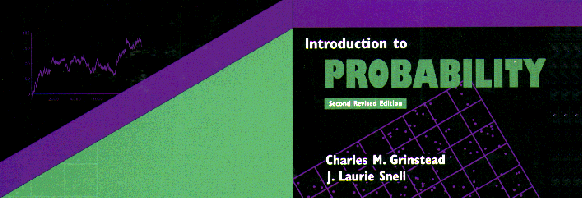 |
 |
This introductory probability book, published by the American Mathematical Society, is available from AMS bookshop. It has, since publication, also been available for download here in pdf format. We are pleased that this has made our book more widely available.
We are pleased to announce that our book has now been made freely redistributable under the terms of the GNU Free Documentation License (FDL), as published by the Free Software Foundation. Briefly stated, the FDL permits you to do whatever you like with a work, as long as you don't prevent anyone else from doing what they like with it. This is the same license that is used for the Wikipedia. Here is the GNU version in pdf, and here is the source",
Thanks: We owe our ability to distribute this work under the FDL to the far-sightedness of the American Mathematical Society. We are particularly grateful for the help and support of John Ewing, AMS Executive Director and Publisher.
Our book emphasizes the use of computing to simulate experiments and make computations. We have prepared a set of programs to go with the book. We have Mathematica, Maple, and TrueBASIC versions of these programs. You can download the programs from this location. We also have experimental versions of the programs as Java applets written for us by Julian Devlin. The answers to the odd-numbered problems are available from this website. We would be happy to provide the solutions to all of the exercises to instructors of courses that use this book. Requests should be sent to jlsnell@dartmouth.edu. Errata found since the second printing of the book can be found in errata. We would appreciate hearing from you concerning additional corrections and suggestions for improvement. Send comments to jlsnell@dartmouth.edu or cgrinst1@swarthmore.edu.
Contributions to the GNU version of our book.
This discussion relates to Exercise 24 in Chapter 11 concerning "Kemeny's Constant" and the question: Should Peter have been given the prize?
In the historical remarks for section 6.1, Grinstead and Snell describe Huygen's approach to expected value. The were based on Huygen's book The Value of all Chances in Games of Fortune which can also be found here. Peter reworks Hygen's discussion to show connections with modern ideas such fair markets and hedging. He illustrate the limitation of hedging using a variant of the St. Petersburg Paradox.
In Feller's Introduction to Probability theory and Its Applications, volume 1, 3d ed, p. 194, exercise 10, there is formulated a version of the local limit theorem which is applicable to the hypergeometric distribution, which governs sampling without replacement. In the simpler case of sampling with replacement, the classical DeMoivre-Laplace theorem is applicable. Feller's conditions seem too stringent for applications and are difficult t to prove. It is the purpose of this note to re-formulate and prove a suitable limit theorem with broad applicability to sampling from a finite population which is suitably large in comparison to the sample size.
These are programs to demonstrate basic ideas of probability and statistics that can be run from the Web using one of the standard browsers. We will try to keep here only programs that work and do not crash your computer too often.
This is the homepage for Chance Magazine. This is a magazine of the American Statistical Association published by Springer-Verlag. Chance Magazine may be considered the "Scientific American" of probability and statistics.
A source for all that's new in Interacting Particle Systems. Each week you find a new and beautiful graphical picture and the recipe that produced it. Show your students what fun they can have if they continue their study of probability.